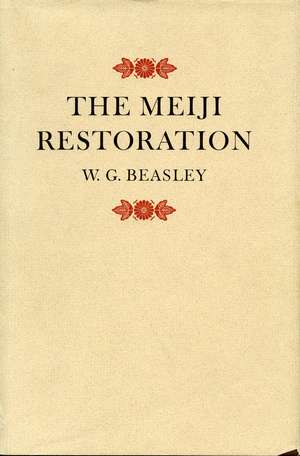The Meiji Restoration
Autor W. Beasleyen Limba Engleză Hardback – 31 mai 1972
First, there are questions concerning the role and relative importance of internal and external factors in the pattern of events. Did the activities of the Western powers prompt changes in Japan that would not otherwise have taken place? Or did they merely hasten a process that had already begun? Similarly, did Western civilization give a new direction to Japanese development, or do no more than provide the outward forms through which indigenous change could manifest itself? Was it a matrix, or only a shopping list?
Second, how far was the evolution of modern Japan in some sense "inevitable"? Were the main features of Meiji society already implicit in the Tempo reforms, only awaiting an appropriate trigger to bring them into being? More narrowly, was the character of Meiji institutions determined by the social composition of the anti-Tokugawa movement, or did it derive from a situation that took shape only after the Bakufu was overthrown? This is to pose the problem of the relationship between day-to-day politics and long-term socioeconomic change. One can argue, paraphrasing Toyama, that the political controversy about foreign affairs provided the means by which basic socioeconomic factors became effective; or one can say, with Sakata, that the relevance of socioeconomic change is that it helped to decide the manner in which the fundamentally political ramifications of the foreign question were worked out. The difference of emphasis is significant.
Finally, have recent historians, in their preoccupation with other issues, lost sight of something important in their relative neglect of ideas qua ideas? Ought we perhaps to stop treating loyalty to the Emperor as simply a manifestation of something else? After all, the men whose actions are the object of our study took that loyalty seriously enough, certainly as an instrument of politics, if not as an article of faith.
Second, how far was the evolution of modern Japan in some sense "inevitable"? Were the main features of Meiji society already implicit in the Tempo reforms, only awaiting an appropriate trigger to bring them into being? More narrowly, was the character of Meiji institutions determined by the social composition of the anti-Tokugawa movement, or did it derive from a situation that took shape only after the Bakufu was overthrown? This is to pose the problem of the relationship between day-to-day politics and long-term socioeconomic change. One can argue, paraphrasing Toyama, that the political controversy about foreign affairs provided the means by which basic socioeconomic factors became effective; or one can say, with Sakata, that the relevance of socioeconomic change is that it helped to decide the manner in which the fundamentally political ramifications of the foreign question were worked out. The difference of emphasis is significant.
Finally, have recent historians, in their preoccupation with other issues, lost sight of something important in their relative neglect of ideas qua ideas? Ought we perhaps to stop treating loyalty to the Emperor as simply a manifestation of something else? After all, the men whose actions are the object of our study took that loyalty seriously enough, certainly as an instrument of politics, if not as an article of faith.
Preț: 577.34 lei
Preț vechi: 712.77 lei
-19% Nou
Puncte Express: 866
Preț estimativ în valută:
110.48€ • 114.15$ • 91.90£
110.48€ • 114.15$ • 91.90£
Carte tipărită la comandă
Livrare economică 19 martie-02 aprilie
Preluare comenzi: 021 569.72.76
Specificații
ISBN-13: 9780804708159
ISBN-10: 0804708150
Pagini: 528
Dimensiuni: 157 x 236 x 43 mm
Greutate: 0.98 kg
Ediția:Anniversary.
Editura: Stanford University Press
Colecția Stanford University Press
ISBN-10: 0804708150
Pagini: 528
Dimensiuni: 157 x 236 x 43 mm
Greutate: 0.98 kg
Ediția:Anniversary.
Editura: Stanford University Press
Colecția Stanford University Press
